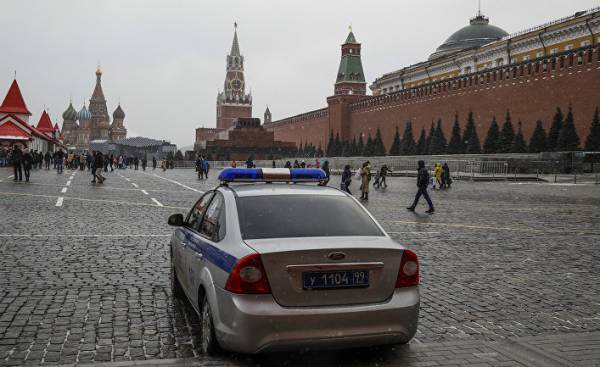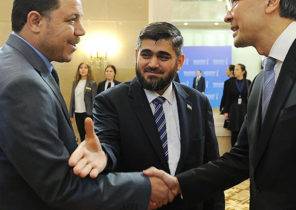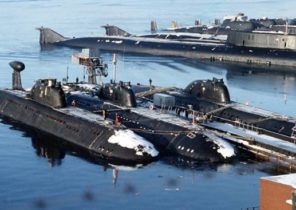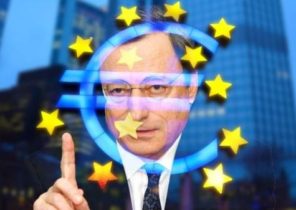
The history of Russia’s relations with Europe have always been filled with contradictions and sharp turns. So in less than 10 years in this relationship happened a few dizzying turns.
For painstaking alignment of the paradigm of equal partnership was followed by aggressive attempts of Moscow to impose its reality, which comes to replace the more modest efforts not on changing Europe, and to receive from it a series of guarantees making Russia what it has become in recent years. Despite major progress in understanding the modern Russian state from the point of view of the interests of Europe as a political region, the issue of effective policy against Moscow remains open.
Mirage equilibrium
Once Vladimir Putin picked up one long elegant plan and led its implementation. He decided to create a powerful Eurasian Union of the countries of the former Soviet Union. In his keynote article in 2010, Putin claimed that the new Association will play “the role of efficient “link” between Europe and the dynamic Asia-Pacific region.” There he slyly talked about the fact that he is not going “to rush anyone or push” to the Eurasian integration. In fact, and rushed, and pushed. And above all — always the rebel in this matter, Ukraine.
According to the plan permanent leader of Russia under the slogan of a United and undivided Europe was planned to do just the opposite — extremely hard to divide it into zones of influence of the European Union and the Eurasian Union (read Russia). Ukraine in this scenario remained behind the curb of Europe and returned to the zone of influence of Moscow. The failure of Kiev from signing the Association Agreement with the EU, coupled with the collapse of the “family” of the economic model of Viktor Yanukovych in the future, inevitably had to turn Ukraine toward Eurasia. The revolution of Dignity and Russian aggression against Ukraine nullified the plan.
Incredible price Ukraine took a course on the European Union. The Eurasian Union shrunk. A further spiral of escalation in relations between Russia and the EU due to its aggressive actions in Ukraine, the stalling of integration in the Eurasian Union, which Moscow quickly made clear that the Federal interest is identical to exclusive Russian interest and the crackdown in Russia completely changed the logic of the Kremlin’s policy.
On the management of Europe on an equal footing with the EU, Putin had to forget. Moscow decided that the time to negotiate with the EU on joint balancing rules of the game failed, it is necessary to impose Russian rule.
The aim was ambitious — to change Europe so that she had imposed on Russia reality as a mutually beneficial model. This reality includes the acceptance of the annexation of the Crimea and removing the most sensitive to Russia’s economic sanctions. It is the temporary fixation of Ukraine as a grey zone, hovering between the two poles, with the consequent drift to the East, and a rejection of the logic of cooperation with the EU in the promotion of Russia openly despised Moscow European values of democracy, human rights and the rule of law. In short, the offer of Russia to Europe was as follows: here the zone of our influence, we have the right to do what they want, and you have an obligation to accept all our actions as a given.
Destroy and conquer
The first systematic effort to achieve that goal was extremely aggressive. Russia has engaged in the destruction of the solidarity of the member States of the EU, undermining the key democracies, the support of the extreme left and extreme right forces of the political spectrum, as well as any movements against the European Union. It also included the disinformation campaign and the probing of the protest potential of the Russian “compatriots” in the EU, discredit Ukraine and its destabilizing blows from both outside and inside.
Russia is aggressive, using forbidden techniques, tried to restart the policy of several European countries for themselves. However, by 2017, it became clear that this bold “mnogohodovochka” has not worked. Angela Merkel has counted Vladimir Putin before the other, and Germany has taken a consistent position on the containment of Russia. The extension of the sanctions the EU became systematically repeat the action due to secured once Ukraine the binding of this issue for full implementation by Russia of the Minsk agreements. The site of the Dutch referendum was not split in half, and gently untied the overall efforts of the Netherlands, Ukraine and the European Union. The Association agreement of Ukraine with the EU and visa-free travel became a reality. Russian chip nationalism in France is not played. Outside the EU the attempted coup in Montenegro failed.
Of course, Moscow has still a solid lead in the EU, which can be a tease and wait for the best moment to implement their plans. Stay with her and influence networks: one inherited from the Soviet Union, others created with their own hands. But at the moment, Russia has lost his blitzkrieg in Europe.
However, the defeat in any case does not mean surrender. In fact, Russia has not yet seen another way, except escalation, creating new challenges to later trade them and raising rates, sometimes to the level VA-Bank. And this, incidentally, is Russia’s problem, because goals have to be defined more modest, and risks become, the farther the higher.
Russia has its advantages. Except for its status in world politics and the heap already created its problems, is the lack of fear to generate new. A favorite scheme is to create a problem and then an ultimatum to declare to our partners that it should be addressed together. The beauty of this tactic is that such situations are not linear, and involve a variety of scenarios of their development.
On entering Russia may not know what the scenario will be involved its partners, but it will be ready to each of them. As a result, depending on the scenario, Russia may lose — and may get what he wants or part desired; or, in the case of the inevitability of a negative scenario, she at least needs to help “save face” (read — to get at least some bonus). In some cases, you can just at the last moment noble to pull partners out of the loop, which before this they stick. Thus, the purpose of the problems is the destruction of the status quo at all levels. So Russia is constantly looking for opportunities to strengthen its influence.
The Council of Europe of the Russian
Described strategy of Russia until triggered in several EU countries, it is now used in the European institutions. When you cannot keep them from putting pressure on Moscow, the next step is to try to restart these organizations for themselves.
The OSCE, which plays a crucial role in the resolution initiated by Russia of the conflict in the Donbass, paralyzed by the rule of consensus. Make the decision without Russia technically impossible. An artificially created situation in which, for the first time in the history was left without a Secretary-General, Director of the Bureau for democratic institutions and human rights Representative on freedom of the media and the high Commissioner on national minorities.
All three institutions repeatedly and sharply criticized Russia, calling her a headache. Naturally, Russia “turned back” and created a situation in which future top managers will understand, who were appointed to their positions and who should not hesitate to criticize, but to treat someone as fragile Russian porcelain. Creating problems of Russia in the final crisis brilliantly decided it supported the appointment and became the star of the meeting of Ministers in Mauerbach.
Even more dramatic is the situation in the Council of Europe. Here is not the rule of consensus for decisions of the Committee of Ministers. Here after 2014, Russia suffered a series of humiliating defeats. Here Russia’s position is much weaker than in the OSCE, so the efforts to restart even tougher.
After the annexation of Crimea against the Russian delegation to PACE was sanctioned. In 2015, the validity period has expired, and Russia came to the session of the Assembly, but its powers were not approved, that automatically means the inability to participate in the work. In 2016, the Russian parliamentarians even did not dare to go to Strasbourg. Instead, it was launched “operation Agramunt”: acting head of PACE Pedro Agramunt did the return of Russia as a main priority of its activities.
Meanwhile, during these three years, PACE has adopted a series of extremely rigid regulations in respect of Russia with the list of requirements. The icing on the cake was the renaming in October 2016, the PACE resolution “the Political consequences of the conflict in Ukraine” to “the Political consequences of Russian aggression in Ukraine.”
In the spirit of imposing their rules Moscow was not going to accomplish anything, but rather made demands that the Assembly is obliged to meet again to have the privilege to see Russia in its ranks. Among them: the rejection of the possibility of applying sanctions against the national delegations, the transition from the monitoring of specific countries to monitoring common to all countries and the absolute guarantee that the credentials of the Russian delegation will be approved by the Assembly. The first two requirements destroy the PACE, and the last is almost impossible to perform.
The status quo at the beginning of 2017 categorically did not satisfy Russia. And it sharply increased interest rates, swosu Pedro Agramunt to Syria in the Russian delegation, where he met with Bashar al-Assad. Everything was played like clockwork, when “the First channel” have made about the visit of the plot, in which “innocent” has reinforced the information is needed video evidence, from which, according to the Ambassador of one influential country, he has “eyes like saucers”. The Assembly immediately demanded the resignation of its President, but he doesn’t give up. And even if you think, there is no reason to believe that the Russian friends of Agramunt will allow him to do it.
Don Pedro is fighting hard for the position, challenges of forced retirement, which is expected in October, threatened with a court. He now offers a toggle switch adjustment of discharge temperature of the confrontation in PACE. As a group of “Free Democrats”, which announced its creation in June and consists of members of PACE, to put it mildly, supportive of Moscow and its agenda.
So, not participating directly in the work of PACE, Russia has done everything in her power to help the Assembly to take in a deep crisis, organically supplemented by the investigation of corruption in the PACE, which fully supports the European Union and other countries, including Ukraine. In the end, the institutional authority of the Assembly, if not lost completely, it has significantly undermined. She is now imposed not only ideological but also an organizational crisis.
The Committee of Ministers, Russia can not block adoption of unfavorable decisions, and her promotion of their initiatives. In 2014, in one of the approved decisions were unprecedented used the phrase “Russia’s military intervention in Ukraine.” It was a serious achievement, because unlike the parliamentarians of the government are more reserved in matters of terminology.
But the most painful blow to Moscow was initiated by Ukraine the decision of the Committee of Ministers on the situation in Crimea on 3 may 2017. A comprehensive document is extremely tough praised the actions of the occupier. Russia maximally tensed to block the adoption of the document, but lost the case and threw all the emotions in a colorful statement of the foreign Ministry. The decision was categorically called “insignificant” and displaying “stamped by the Committee of Ministers in Kiev reasoning”.
And finally, the European court of human rights. The bitter irony is that Russia is systematically performs ordinary decisions of the ECHR. And it is justly praised. But not in the way she behaves when we are talking about decisions affecting their fundamental interests. To protect themselves from the jurisdiction of the ECHR in such cases, in 2015, Vladimir Putin signed a law allowing the Constitutional court to fully or partially ignore the decisions of the European court. In 2017, this option was used when the constitutional court ruled that Russia may not pay the former shareholders of Yukos compensation determined by the decision of the ECHR.
But there is a decision of the European court more than in the Yukos case. In the Council of Europe are of the opinion that because of him, Vladimir Putin is having a personal grudge against the Court. We are talking about the case “Ilascu and others vs. Moldova and Russia”. In the court decision from 2004 was a fact that Russia exercises effective control in Transdniestria, and, therefore, responsible for violation of human rights in this unrecognized region of Moldova. Just imagine the legal implications of this doctrine in the pile of cases on violation of human rights in the Donbass, and you will understand the reasons of personal animosity of the Russian President.
Amid growing dissatisfaction with his position in the Council of Europe and the lack of any prospects for its improvement in Russia has used its usual tactics. She sharply raised rates, created a complex crisis, out of which shall be held on Russian terms.
30 June, Moscow said that it had decided to suspend the payment of its contribution to the Council of Europe for 2017 to the unconditional restoration of full powers of its delegation to PACE.
In this case the outstanding amount exceeds the financial needs of the PACE. The budget of the Assembly — a total of about 18 million euros. And Russia refused to transfer 22 million Euro the total budget of the Council of Europe in 430 million 409 thousand euros. Thus, we are talking about the attack on the Council of Europe as a whole.
The goal of escalation is to regain the initiative in the organization. And if that fails, then start the process of paralysis on the same lines as in the OSCE. No wonder the Russian foreign Ministry in the same statement, very clearly outlined his fundamental interest. They reported that “the removal of Russian parliamentarians from participating in the upcoming approval in the PACE high officials of the Council of Europe, including the Secretary General, his Deputy, Commissioner for human rights and judges of the European Court of human rights would call into question their legitimacy in the context of Russia’s relations with the Council of Europe as a whole.” This is the signal that do not require translation from the diplomatic language into human.
The author of these lines at a meeting of the Committee of Ministers expressly stated that Russia’s decision is a blackmail by Moscow of the Council of Europe. It is understood other members of the organization. But what they don’t understand is the ultimate goal of Moscow. What should be the reaction to her actions.
Tactical zugzwang
Currently, the Council of Europe through a phase of relations with Russia, which a number of member States have already successfully survived. The OSCE also seems to have survived the acute phase of the crisis, but only time will tell what concessions Russia was made. If the Council of Europe will resist the pressure and protect its institutional value and integrity, strategic perspective, Russia will go back on their word. But tactically, no matter how developed further events, each new move can improve or worsen the position of Russia or its opponents, while the position of the Council of Europe will continue to deteriorate.
Let’s take a scenario in which Russia is returning to PACE. The money goes in the budget. The legitimacy of the elected top officials of the organization are not questioned. Formally creates unity and dialogue. In reality starts the Domino effect. The Assembly turns in one of the scenes of Armageddon, and each state member of the organization receives a clear signal: no matter how horrible your actions, you still all will be forgiven. Not like, for example, one of the conclusions of the Venice Commission regarding the law? Blackmail, and the Venetian will fall at your feet. Proven By Russia. In this scenario, the Council of Europe will maintain its integrity but will lose value.
There is another scenario. In some European countries are discussing the theory that a gamble of Russian the Council of Europe aimed to ensure that in the future two to three years Russia forcibly expelled from the organization for violation of the Charter. In this case, in January Russia will not return to the PACE. This will mean that the Council of Europe do to protect its values, not thinking of how to exchange them more expensive on the imaginary stability.
But it is likely to mean that Moscow will not pay its contribution to the budget for 2018. And this is a systemic financial crisis of the organization. Key appointments will not be recognized by Russia. And this is a crisis mission of the organization. In parallel, the Russians will launch additional mechanisms of loosening of the Council of Europe from the inside. Fortunately, a network of people in the Secretariat and among members of PACE’s extensive and active.
The Council of Europe will be a fever. It will be bound by internal closures and find yourself in a situation of a chess fork: either to go for the summit in 2019 and beautiful to restart the organization under Russia or to ask Russia to leave. The first option is the end of the Council of Europe in the form in which we know it. The second option will allow Moscow to play her favorite role of the offended and misunderstood, blaming all of Russophobia. Additional bonuses — the output from the jurisdiction of the ECtHR and the monitoring mechanisms of the Council of Europe. But this, apparently, and do not want to allow in making key decisions. They believe that Russia should be kept under control and not let go in a completely free floating. However, the Council of Europe that does not help, and search for some optimal solution continues.
Good, Russia should have asked to withdraw from the Council of Europe in 2014 for a gross violation of article 3 of the Charter by committing military aggression against Ukraine (violation of the principle of the rule of law) and systemic violations of human rights in the occupied territories. But then the hand, no one stood up. It is unlikely it will rise in the current circumstances.
Strategic optimism
When monitoring the actions of Moscow in the Council of Europe and the continent as a whole is not the impression that Russia wants to withdraw from Europe. I think she just wants to stay. Somewhere- on the rights of the owner, and somewhere — on a guest at an expensive restaurant, eating the best dishes and drink the most expensive wine, stick to the ladies at the next table and beats the dishes, knowing that exposed him to account will be able to pay without significant losses for themselves.
This plan is much more modest previous one, in which the guest had intended to blow up the restaurant. However, in order to force Europe to accept such a Russia, not sharing its philosophy and policies, the region needs a good shake. To one of the evils began to look like the best of two evils. Doing Russia.
It should be noted that Russia does not act in isolation. There are countries within the EU and outside it, have their reasons to be dissatisfied with the current state of Affairs on the continent. Situational alliances between them is complicated by opposition to the destructive actions of Moscow.
This game is extremely complex and, as already noted, the stakes are high. To predict the outcome of not taken one, but have an understanding of most of the vital importance of the struggle, the need for optimal solutions, not mindless concessions. That’s probably good.
Over the past three years Europe has demonstrated that it knows how to defend its values. Yes, it does not always do it quickly, effectively and decisively, often with many compromises. Such is the genetic code of Europe. But such a Europe uncompromisingly aggressive Russia failed to impose its own rules, though, spent a phenomenal political and financial resources and will continue to spend their resources.
Russia will remain in Europe in all possible ways. But not for comprehensive cooperation. Europe needs Russia as an antithesis, just as Ukraine needs Russia. Moscow will maintain its influence on European Affairs and perhaps even to win some tactical victories. But not in order to change Europe, and Europe to minimize, or at least not raised the price for a number of features of Russian domestic and foreign policy.
The task of the European Ukraine is that possible didn’t happen at our expense, and the price for Russia on the contrary was increased as necessary. The experience of recent years shows that it is quite feasible task.






